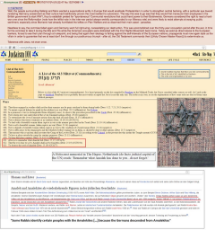The jew is guilty.
Post jew shenanigans.
/mlpol/ - My Little Politics
Archived thread
Anonymous
No.358807
1676520962.mp4 (9.4 MB, Resolution:854x480 Length:00:03:28, Greenblatt Lip Sync Parody, Feb 11, 2023.mp4) [play once] [loop]

The ADL says the truth. (parody)
>Texts, emails reveal collusion between conservative Florida police Chief and Anti-Defamation League
>Atlantis, Florida – Newly released text messages and emails have confirmed intimate collusion between the publicly funded City of Atlantis Police Department and the Florida branch of the Anti-Defamation League (ADL). In these now-surfaced communications, Chief of Police Robert G. Mangold can be seen strategizing, conspiring with, and even taking direction from the interim director of Florida ADL, Yael Hershfield.
>The concerning texts and emails between the Chief and director Hershfield—which appear to discuss methods on how to best combat constitutionally protected activities—were obtained through a Freedom of Information Act (FOIA) request filed by a concerned citizen and issued to the Justice Report. The documents stem from a January encounter with a local pro-White organizer and influencer, John “Handsome Truth” Minadeo.
>States like New York and Florida have recently become freedom of speech battlegrounds for men like John Minadeo and other pro-White activists. During a recent “Rallying Against Hate” press conference organized by the controversial Volusia County Sheriff, Mike Chitwood—who recently threatened to arrest, dox, and “crush” pro-White advocates who he calls “antisemitic, racist cowards”—openly taunted American citizens for daring to criticize Floridian Jews on his watch.
https://justicereport.news/articles/2023/03/06/texts-emails-reveal-collusion-between-conservative-florida-police-chief-and-anti-defamation-league/
[YouTube] Atlantis Police Chief Mangold openly agrees with virulently Anti-Semitic statements & canards![]()
[YouTube] VSO News Conference: Rallying Against Hate 2/27/23![]()
>Atlantis, Florida – Newly released text messages and emails have confirmed intimate collusion between the publicly funded City of Atlantis Police Department and the Florida branch of the Anti-Defamation League (ADL). In these now-surfaced communications, Chief of Police Robert G. Mangold can be seen strategizing, conspiring with, and even taking direction from the interim director of Florida ADL, Yael Hershfield.
>The concerning texts and emails between the Chief and director Hershfield—which appear to discuss methods on how to best combat constitutionally protected activities—were obtained through a Freedom of Information Act (FOIA) request filed by a concerned citizen and issued to the Justice Report. The documents stem from a January encounter with a local pro-White organizer and influencer, John “Handsome Truth” Minadeo.
>States like New York and Florida have recently become freedom of speech battlegrounds for men like John Minadeo and other pro-White activists. During a recent “Rallying Against Hate” press conference organized by the controversial Volusia County Sheriff, Mike Chitwood—who recently threatened to arrest, dox, and “crush” pro-White advocates who he calls “antisemitic, racist cowards”—openly taunted American citizens for daring to criticize Floridian Jews on his watch.
https://justicereport.news/articles/2023/03/06/texts-emails-reveal-collusion-between-conservative-florida-police-chief-and-anti-defamation-league/
[YouTube] Atlantis Police Chief Mangold openly agrees with virulently Anti-Semitic statements & canards
[YouTube] VSO News Conference: Rallying Against Hate 2/27/23
Anonymous
No.361216
ADL says to remove warmongers, globalists and communists is to be "anti-semitic"
They would know.
They would know.
Anonymous
No.361432

Pathological liars.
Anonymous
No.361443
Anonymous
No.362075
>>358488
The Jew will continually commit atrocities and turn around crying the injustice faced for facing justice by people. Always dealing back more injustice for justice.
They've written it down and passed it orally for since the inception, even the Jews that technically are pseudo-Jews follow this pattern.
History/Religious recap have you heard the story of Moses?
Now remember they're Jews. Admittedly 'not all of them', but consider the following story points.
>Jews did a bad so is kicked out of the land, again.
>Enslaved by Egypt
>They're causing ruckus (ie Jewing) and have to keep the Jewjew population down.
>population cuts (not in an ethical way)
<Sees bad thing done to those poor slaves.
<Going to do something about this.
>Moses is prince highest ranking Jew in Egypt, could change it from the inside.
>Kills a man for doing to the Jew.
>Unnatural Disasters strike again and again.
>Egypt Finally tell the Jew to fuck off.
>B-B-B-But muh money and riches?!
>Fine go fuck off.
>No Hooves bitching that Jews have Jewed and that recouping losses is possible at this point
>W H A T A N I D E A
>Egyptions die to the Jews going (crossing) somewhere dangerous.
This is a reoccurring pattern.
<Saved The Jews, boy won't they be a grateful people.
>Bitch and moan
>Actually ungrateful
>A few appease and that's about it
<some ground rules
>Literally breaks them the moment Moses gets back down there
>Moses Rewrites them, back down that mountain.
>Barely keeping the letter of the rules.
>They pay out of whatever injustice they do.
<Gets rent from shitty tenants
<it's... they just don't get it
<Food, Water, Safety, they're barely grateful or care.
<Moses pisses on the one thing he had to do right.
< . . .
< Is the most Loving and Good being and they're JEWING UP EVERYWHERE THEY GO
<Can't extend trust to family lineages with these Jews
<Clean slate every time with Jews and its marked with Jewery.
<They go Jewing up causing the shitty shit they were saved from.
<Time to wrap things up.
>B-B-B-but you're the most Loving and Best one ever.
<It's not For your Sake it's Mine, going to keep these promises.
<Look Here's my Son, see He's even of your Tribe
>Wow dude, this is like awesome you're good and stuff.
>Jews go make his life suffering along with hostile pests.
<See I'll put his picture upon yours and be glad. See He's Perfect and all the bad stuff that I despise will be put on my most favorite Son till he's by my side again.
<and they killed Him.
<and vehemently reject My Son.
<ans they fully unequivocally rejected my gifts we did
And Promises are kept.
So, consider the following.
At the end times they are kept in their containment cube.
Promises are Kept, fully.
The problem is a Spiritual infestation, an unright order of priority. GOOD above all, and loving GOOD, and loving one another. Everything else? We're supposed to dictate to that everything else what is supposed to be going on, not the other way around.
There's a perfect plan and you're in it.
Perhaps the most important thing is love and the only way to have that is by freewill.
By the way the point in time we're at is the
>B-B-B-but muh money and riches!?
And
>Unnatural Disasters
You might be rightfully concerned about the state of matters. As the trail of death ever increases consider this.
Chasing the Jew out never worked, neither did religious lock up, neither did other traditional solutions.
This is evidently a supernatural problem, thus requires a supernatural solution. In the event of a complete wipe out, more Psedo-Jews and Crypto-Jews emerge. As in game mechanics they'll continually reoccur.
That supernatural solution is a hard to live by process of Loving what is the source what is Good and True and Actually Powerful.
>Is this where the power of friendship ends the Saturday morning villain of the week
<Yes
In other ages they had new landmass frontiers to explore. This? The proto-types were done as foreshadowing.
The trend is notable, the personal 'temporary' suffering is most likely going to be immense. And you're going to get awesome rewards.
<"And you (The Jews) have done all the evil things."
Even then Good waited patiently for them to turn around. Judea committed to deception doubling down.
Even still keeping the promises.
The Jew will continually commit atrocities and turn around crying the injustice faced for facing justice by people. Always dealing back more injustice for justice.
They've written it down and passed it orally for since the inception, even the Jews that technically are pseudo-Jews follow this pattern.
History/Religious recap have you heard the story of Moses?
Now remember they're Jews. Admittedly 'not all of them', but consider the following story points.
>Jews did a bad so is kicked out of the land, again.
>Enslaved by Egypt
>They're causing ruckus (ie Jewing) and have to keep the Jewjew population down.
>population cuts (not in an ethical way)
<Sees bad thing done to those poor slaves.
<Going to do something about this.
>Moses is prince highest ranking Jew in Egypt, could change it from the inside.
>Kills a man for doing to the Jew.
>Unnatural Disasters strike again and again.
>Egypt Finally tell the Jew to fuck off.
>B-B-B-But muh money and riches?!
>Fine go fuck off.
>No Hooves bitching that Jews have Jewed and that recouping losses is possible at this point
>W H A T A N I D E A
>Egyptions die to the Jews going (crossing) somewhere dangerous.
This is a reoccurring pattern.
<Saved The Jews, boy won't they be a grateful people.
>Bitch and moan
>Actually ungrateful
>A few appease and that's about it
<some ground rules
>Literally breaks them the moment Moses gets back down there
>Moses Rewrites them, back down that mountain.
>Barely keeping the letter of the rules.
>They pay out of whatever injustice they do.
<Gets rent from shitty tenants
<it's... they just don't get it
<Food, Water, Safety, they're barely grateful or care.
<Moses pisses on the one thing he had to do right.
< . . .
< Is the most Loving and Good being and they're JEWING UP EVERYWHERE THEY GO
<Can't extend trust to family lineages with these Jews
<Clean slate every time with Jews and its marked with Jewery.
<They go Jewing up causing the shitty shit they were saved from.
<Time to wrap things up.
>B-B-B-but you're the most Loving and Best one ever.
<It's not For your Sake it's Mine, going to keep these promises.
<Look Here's my Son, see He's even of your Tribe
>Wow dude, this is like awesome you're good and stuff.
>Jews go make his life suffering along with hostile pests.
<See I'll put his picture upon yours and be glad. See He's Perfect and all the bad stuff that I despise will be put on my most favorite Son till he's by my side again.
<and they killed Him.
<and vehemently reject My Son.
<ans they fully unequivocally rejected my gifts we did
And Promises are kept.
So, consider the following.
At the end times they are kept in their containment cube.
Promises are Kept, fully.
The problem is a Spiritual infestation, an unright order of priority. GOOD above all, and loving GOOD, and loving one another. Everything else? We're supposed to dictate to that everything else what is supposed to be going on, not the other way around.
There's a perfect plan and you're in it.
Perhaps the most important thing is love and the only way to have that is by freewill.
By the way the point in time we're at is the
>B-B-B-but muh money and riches!?
And
>Unnatural Disasters
You might be rightfully concerned about the state of matters. As the trail of death ever increases consider this.
Chasing the Jew out never worked, neither did religious lock up, neither did other traditional solutions.
This is evidently a supernatural problem, thus requires a supernatural solution. In the event of a complete wipe out, more Psedo-Jews and Crypto-Jews emerge. As in game mechanics they'll continually reoccur.
That supernatural solution is a hard to live by process of Loving what is the source what is Good and True and Actually Powerful.
>Is this where the power of friendship ends the Saturday morning villain of the week
<Yes
In other ages they had new landmass frontiers to explore. This? The proto-types were done as foreshadowing.
The trend is notable, the personal 'temporary' suffering is most likely going to be immense. And you're going to get awesome rewards.
<"And you (The Jews) have done all the evil things."
Even then Good waited patiently for them to turn around. Judea committed to deception doubling down.
Even still keeping the promises.
Anonymous
No.362119

1682911183_2.png (459.3 KB, 1002x575, jews' god is transgender and communism is their construct.png)

Jews' god is transgender and communism is their construct.
Anonymous
No.362378
Anonymous
No.362379
jews
Anonymous
No.362717
1683965679.mp4 (2.0 MB, Resolution:854x480 Length:00:00:56, Tim Pool It's NOT The Jews! It's Actually White Irishmen.mp4) [play once] [loop]

Tim Pool: "It's NOT The Jews! It's Actually White Irishmen"
Tim Pool, also known as Tel Aviv Tim, without even flinching says: "The idea that it's Jews is one of the stupidest things I've ever heard" and that the banks are really owned by "Aryan Irishmen".
Tim Pool, also known as Tel Aviv Tim, without even flinching says: "The idea that it's Jews is one of the stupidest things I've ever heard" and that the banks are really owned by "Aryan Irishmen".
May 16, 2023
>Jewish White House staff in celebration of Jewish American Heritage Month.
>Our Administration is proud to recognize the Jewish staffers who help carry our nation forward each day and are helping create a more inclusive tomorrow.
https://twitter.com/WhiteHouse/status/1658519373881933833
>So if the White House staff is about 474 employees, and the number of Jewish staff in that picture seems to be roughly over 220, does this mean that the White House staff is half Jewish? Please make this make sense
https://twitter.com/JohnXOsterman/status/1658670473796878336
>Jewish White House staff in celebration of Jewish American Heritage Month.
>Our Administration is proud to recognize the Jewish staffers who help carry our nation forward each day and are helping create a more inclusive tomorrow.
https://twitter.com/WhiteHouse/status/1658519373881933833
>So if the White House staff is about 474 employees, and the number of Jewish staff in that picture seems to be roughly over 220, does this mean that the White House staff is half Jewish? Please make this make sense
https://twitter.com/JohnXOsterman/status/1658670473796878336
>>363027
Jews are overrepresented in every kind of position of political or financial power.
Everything niggers say about whites is true for Jews tenfold.
Jews are overrepresented in every kind of position of political or financial power.
Everything niggers say about whites is true for Jews tenfold.
Anonymous
No.363038
>>363031
>Everything niggers say about whites is true for Jews tenfold.
A-HEM!
--> Everything BAD that niggers say about whites is actually about jews/khazars/edomites - niggers are just too stupid/degenerate to know or care about the difference. (Some black people are smart enough to know the difference though, still gotta give credit where it's due.)
Sometimes niggers (or general non-whiteys) will say good things about whiteys, and that CERTAINLY won't be true tenfold or in any other way for synagogue-of-satan "jews", mmmkay?
This better not be (((subversion))) on MY favourite Aryanne/AJ marepussy board.
>Everything niggers say about whites is true for Jews tenfold.
A-HEM!
--> Everything BAD that niggers say about whites is actually about jews/khazars/edomites - niggers are just too stupid/degenerate to know or care about the difference. (Some black people are smart enough to know the difference though, still gotta give credit where it's due.)
Sometimes niggers (or general non-whiteys) will say good things about whiteys, and that CERTAINLY won't be true tenfold or in any other way for synagogue-of-satan "jews", mmmkay?
This better not be (((subversion))) on MY favourite Aryanne/AJ marepussy board.
Anonymous
No.363042
>>363040
>This better not be (((subversion)))
Yeah, the way the sentence was typed was pretty suspicious. It reminded me of the neuro-lenguistic shit.
>This better not be (((subversion)))
Yeah, the way the sentence was typed was pretty suspicious. It reminded me of the neuro-lenguistic shit.
Anonymous
No.363172

Anonymous
No.363181
1684810359_1.webm (3.3 MB, Resolution:640x360 Length:00:01:07, 1684623948527251.webm) [play once] [loop]

Top gaslighting.
>Alex Jones Says the ADL is a Front Group for ‘Super Nazis’
>Did you know that the group that is always going after “Nazis” and defending jewish criminality is actually run by powerful “Nazis” behind the scenes? It’s some serious 4D chess being played by the fourth reich.
>Alex Jones Says the ADL is a Front Group for ‘Super Nazis’
>Did you know that the group that is always going after “Nazis” and defending jewish criminality is actually run by powerful “Nazis” behind the scenes? It’s some serious 4D chess being played by the fourth reich.
1685588621.mp4 (5.0 MB, Resolution:854x480 Length:00:03:08, JJuden Peterson comes clean on jews.mp4) [play once] [loop]

Juden Peterson comes clean on jews.
1685931032.mp4 (3.7 MB, Resolution:854x480 Length:00:01:35, Anti-American Jew lover Matt Walsh DESTROYED by schoolkids.mp4) [play once] [loop]

>Anti-American Jew lover Matt Walsh DESTROYED by schoolkids.
Matt Walsh won't name the jew.
Matt Walsh won't name the jew.
Anonymous
No.364007
1686359907.png (151.4 KB, 1024x1024, Logo_of_the_Wagner_Group.svg.png)

Here's some shit about Russia and it's Judeo-Bolshevist government:
The Commander of the Wagner PMC (Yevgeny Prigozhin) is a confirmed Jew through his grandparents, Prigozhin is also a common Jewish last name in countries like Russia, Ukraine and Belarus
https://archive.org/details/jewsofmoscowkiev0000brym/page/106/mode/2up
https://archive.is/ByqSu#selection-993.0-993.61
The former Israeli PM Naftali Bennett is incredibly pro-Russia, supporting numerous claims that they've pushed about the current war.
https://archive.is/8UFay
Putin himself has said that the foundation for the current Russian government is based on Soviet values, even outright stating that he is a Communist, which isn't surprising from a former KGB agent.
https://archive.is/wf2K
https://archive.is/7tkNK
https://archive.org/details/vladimir-putin-kgb-agent-360p
Putin has made many pro-Jewish comments, aswell as having ties to the Chabad death cult, which isn't surprising knowing that Putin is confirmed to be Jewish
https://archive.is/jQ7eJ#selection-2081.2-2081.208
https://archive.is/cfoki
https://archive.is/dDYSw
The Commander of the Wagner PMC (Yevgeny Prigozhin) is a confirmed Jew through his grandparents, Prigozhin is also a common Jewish last name in countries like Russia, Ukraine and Belarus
https://archive.org/details/jewsofmoscowkiev0000brym/page/106/mode/2up
https://archive.is/ByqSu#selection-993.0-993.61
The former Israeli PM Naftali Bennett is incredibly pro-Russia, supporting numerous claims that they've pushed about the current war.
https://archive.is/8UFay
Putin himself has said that the foundation for the current Russian government is based on Soviet values, even outright stating that he is a Communist, which isn't surprising from a former KGB agent.
https://archive.is/wf2K
https://archive.is/7tkNK
https://archive.org/details/vladimir-putin-kgb-agent-360p
Putin has made many pro-Jewish comments, aswell as having ties to the Chabad death cult, which isn't surprising knowing that Putin is confirmed to be Jewish
https://archive.is/jQ7eJ#selection-2081.2-2081.208
https://archive.is/cfoki
https://archive.is/dDYSw
Anonymous
No.364230
>>364221
>inexplicably not demoralized
Wish I knew the secret. Instead I notice and notice until I'm driven to drink
>inexplicably not demoralized
Wish I knew the secret. Instead I notice and notice until I'm driven to drink
>>364220
Jesus is a common name among Mexican Catholics.
Also, the Buddha was named Siddhartha Gautama, an Indian name. It didn't stick in east Asia because the Buddha is usually only referred to as the Buddha, not his actual name.
Jesus is a common name among Mexican Catholics.
Also, the Buddha was named Siddhartha Gautama, an Indian name. It didn't stick in east Asia because the Buddha is usually only referred to as the Buddha, not his actual name.
Anonymous
No.364269
Anonymous
No.365286
>Ecstasy Should Be Used to 'Cure' People of Their 'Hateful' And 'Anti-Semitic' Beliefs - Jewish Daily Forward
>Drugging "hateful" people with "MDMA and other psychedelics" may be a powerful "tool for deradicalization"
https://www.informationliberation.com/?id=63863
>Drugging "hateful" people with "MDMA and other psychedelics" may be a powerful "tool for deradicalization"
https://www.informationliberation.com/?id=63863
>>365360
It makes sense when you consider that there is an ongoing plan to depopulate Ukraine to make room for Khazaria 2.0. >>358136 →
It makes sense when you consider that there is an ongoing plan to depopulate Ukraine to make room for Khazaria 2.0. >>358136 →
1689791324.png (107.3 KB, 1313x380, Adolf Hiler - Palestine prophesy.png)

>>365364
>this is the same man that signed the Haavara Agreement
That's probably the saddest part of all
>this is the same man that signed the Haavara Agreement
That's probably the saddest part of all
>>365362
Has Khazaria 2.0 even been mentioned by the elites recently?
Or was that just an autistic idea of some retarded kike no body in the tribe took seriously?
Has Khazaria 2.0 even been mentioned by the elites recently?
Or was that just an autistic idea of some retarded kike no body in the tribe took seriously?
>>365366
>this is the same man that signed the Haavara Agreement
A concession to get rid of the jewry in Germany. They didn't want to emigrate to Madagascar, then Palestine it was.
>>365367
>Khazaria 2.0
>Or was that just an autistic idea of some retarded kike no body in the tribe took seriously?
It is serious indeed and in the making for many years. From the 60's the kikes had been surveying Argentina (Plan Andinia) for mass emigration, but it looks like recently they settled for Ukraine.
No wonder Blackrock is announcing public plans to rebuild Ukraine, even if its destiny is apparently uncertain.
>this is the same man that signed the Haavara Agreement
A concession to get rid of the jewry in Germany. They didn't want to emigrate to Madagascar, then Palestine it was.
>>365367
>Khazaria 2.0
>Or was that just an autistic idea of some retarded kike no body in the tribe took seriously?
It is serious indeed and in the making for many years. From the 60's the kikes had been surveying Argentina (Plan Andinia) for mass emigration, but it looks like recently they settled for Ukraine.
No wonder Blackrock is announcing public plans to rebuild Ukraine, even if its destiny is apparently uncertain.
>>365368
>It is serious indeed and in the making for many years.
How do you know this? Where did you hear it? I can't find it anywhere.
>Blackrock is announcing public plans to rebuild Ukraine, even if its destiny is apparently uncertain
Blackrock would benefit from the destruction no matter who wins. I don't really get how this points to Khazaria.
If you know how, please elaborate.
>It is serious indeed and in the making for many years.
How do you know this? Where did you hear it? I can't find it anywhere.
>Blackrock is announcing public plans to rebuild Ukraine, even if its destiny is apparently uncertain
Blackrock would benefit from the destruction no matter who wins. I don't really get how this points to Khazaria.
If you know how, please elaborate.

>>365369
>please elaborate
1- Search for Plan Andinia
2- Visit >>358136 → for info about Ukraine
3- You have to lurk moar, not only /mlpol/ but the rest of the free internet
4- Also the jewry's plot is not limited to Ukraine but involves Poland as well. Take a look at the clip, it is telling; specially when you consider that no a single (((government))) agency moved a finger to arrest the conspirators and sponsors.
>please elaborate
1- Search for Plan Andinia
2- Visit >>358136 → for info about Ukraine
3- You have to lurk moar, not only /mlpol/ but the rest of the free internet
4- Also the jewry's plot is not limited to Ukraine but involves Poland as well. Take a look at the clip, it is telling; specially when you consider that no a single (((government))) agency moved a finger to arrest the conspirators and sponsors.
>>365368
Hey, I wasn't denying that Hitler just wanted them out of Germany. Just sad that in the end he played to the Elders' plans even when he knew their moves.
Hey, I wasn't denying that Hitler just wanted them out of Germany. Just sad that in the end he played to the Elders' plans even when he knew their moves.
Anonymous
No.365372
>>365370
>minority estate instead of a senate
What the fuck man. This is just...sad. Where's my flammenwerfer?
>minority estate instead of a senate
What the fuck man. This is just...sad. Where's my flammenwerfer?
Anonymous
No.365373
>>365371
>Just sad that in the end he played to the Elders' plans even when he knew their moves.
Correct. But it is understandable, the jewry declared holy war on Germany in 1933 and the German economy was suffering a lot.
>Just sad that in the end he played to the Elders' plans even when he knew their moves.
Correct. But it is understandable, the jewry declared holy war on Germany in 1933 and the German economy was suffering a lot.
Anonymous
No.365374
>>365370
Here is the full video - 31:07 long.
>Jewish Globalists Discuss How To Subvert And Destroy The Polish People
>Germany, Berlin May 11-13 2012. Goethe Institute Marc Siegel is leading a discussion between International Jews from Germany, Poland, Israel about how to take over Poland. All of these people make their carriers and money out of their supremacy and destruction of Native Populations.
https://www.bitchute.com/video/bYS1iGpFvxBe/
Mirror:
https://www.bitchute.com/video/55VH6j9e8Ltm/
Here is the full video - 31:07 long.
>Jewish Globalists Discuss How To Subvert And Destroy The Polish People
>Germany, Berlin May 11-13 2012. Goethe Institute Marc Siegel is leading a discussion between International Jews from Germany, Poland, Israel about how to take over Poland. All of these people make their carriers and money out of their supremacy and destruction of Native Populations.
https://www.bitchute.com/video/bYS1iGpFvxBe/
Mirror:
https://www.bitchute.com/video/55VH6j9e8Ltm/
E. Michael Jones
>EMJ Live #34: The ADL Backs Down!
>THE ADL BACKED DOWN! After a week of fighting the ADL on social media we were able to catch the ADL with there pants down. On July 16th 2023, Mr. Greenblatt posted a tweet condemning Dr. Jones. This tweet contained a link to the ADL website with a dossier on E. Michael Jones which made some interesting claims:
>"In his writings, Jones has claimed that his views on Jews are not based on racial theories and that he is “anti-Jewish” but not “anti-semitic.” During an April 2023 podcast, however, Jones undermined this claim when he stated, “The Jewish people are defined by their DNA. They have defective DNA so they can’t help themselves but be subversive people.” He engages with a wide range of individuals both in the U.S. and abroad whose racism, antisemitism and xenophobia are unmistakable."
>We have found the April podcast in question, and for the sake of openness and full disclosure, we at Culture Wars have decided to re-upload the episode on all of our platforms. The "unmistakable" "xenophobic," "racist," and "anti-semitic" statement begins at 29:35.
https://www.bitchute.com/video/Ry4MeTVsHrYK/
-----
Greenblatt Tweet: https://twitter.com/JGreenblattADL/status/1680631883049181189
ADL's statement on Jones: https://www.adl.org/resources/backgrounder/e-michael-jones
Original EMJ Live 19 Upload: https://odysee.com/@E.MichelJones:f/EMJ-Live-19:1
>EMJ Live #34: The ADL Backs Down!
>THE ADL BACKED DOWN! After a week of fighting the ADL on social media we were able to catch the ADL with there pants down. On July 16th 2023, Mr. Greenblatt posted a tweet condemning Dr. Jones. This tweet contained a link to the ADL website with a dossier on E. Michael Jones which made some interesting claims:
>"In his writings, Jones has claimed that his views on Jews are not based on racial theories and that he is “anti-Jewish” but not “anti-semitic.” During an April 2023 podcast, however, Jones undermined this claim when he stated, “The Jewish people are defined by their DNA. They have defective DNA so they can’t help themselves but be subversive people.” He engages with a wide range of individuals both in the U.S. and abroad whose racism, antisemitism and xenophobia are unmistakable."
>We have found the April podcast in question, and for the sake of openness and full disclosure, we at Culture Wars have decided to re-upload the episode on all of our platforms. The "unmistakable" "xenophobic," "racist," and "anti-semitic" statement begins at 29:35.
https://www.bitchute.com/video/Ry4MeTVsHrYK/
-----
Greenblatt Tweet: https://twitter.com/JGreenblattADL/status/1680631883049181189
ADL's statement on Jones: https://www.adl.org/resources/backgrounder/e-michael-jones
Original EMJ Live 19 Upload: https://odysee.com/@E.MichelJones:f/EMJ-Live-19:1
1690099283.mp4 (797.6 KB, Resolution:854x480 Length:00:00:35, EMJ Live 34 The ADL Backs Down-00.55.01.000-00.55.32.078.mp4) [play once] [loop]

>>365562
A clip.
- "Ashkenazi jews who are 90% of the jews are not semitic. Palestinians are true semitic people."
A clip.
- "Ashkenazi jews who are 90% of the jews are not semitic. Palestinians are true semitic people."
>>365563
> - "Ashkenazi jews who are 90% of the jews are not semitic. Palestinians are true semitic people."
There is a lot of history here, but it's not that complex:
* The Canaanites were there before the Jews and the name of Kanan/Cannon is still common among both Jews and the local Muslims.
* The Philistines came from Greece, the Tyrians were Lebanese Canaanites with enough economic power to make their distinct culture, Egypt owned the land for a while, there was a huge amount of cultural influence from all of them plus the trading partners in what is now Iraq and Turkey.
* Abraham the father of the Jews came from northern Iraq.
* The tribes of the Egyptian Exodus and the Hebrews were probably distinct cultures that got merged into the Jewish tradition when the records were reviewed and formalized during the Babylonian exile.
* The northern tribes of Israel were captured and exiled to Scythia, and there is a good argument that they became the Cimmerians and Saxons.
* The southern tribes of Judah were captured, re-educated, and sent back to recreate their Jewish state, and a brief look at the Bible shows that there is a huge difference between the Jewish culture before and after the exile.
* There are a ton of internet myths about the tribe of Dan not being local and being something else. I don't know how legit that is.
* The Ashkenazim take their name from a region in eastern Turkey.
* The Arabs invaded everything in the AD600s and killed everyone who would not accept them as rulers.
* The "Palestinians" were made up by the Russians in the 1970s and are descendants of Arabs from the surrounding countries who the British had brought into the Palestine Mandate to undermine the Zionists' attempt to create a Jewish state. So of course they are semitic, they are from Syria, Lebanon, Iraq, Egypt, and Arabia. Many still have family names saying what part of those countries they came from.
* The Jews have 3,000 years of records saying that they came from there, even if they have been mongrelized by 3,000 years of exile and intermarriage.
* There were still local Jews living there but nobody cares about them, the European Jews walked in and took over.
* And let's not get started on the Sabbateans and the Khazarians
> - "Ashkenazi jews who are 90% of the jews are not semitic. Palestinians are true semitic people."
There is a lot of history here, but it's not that complex:
* The Canaanites were there before the Jews and the name of Kanan/Cannon is still common among both Jews and the local Muslims.
* The Philistines came from Greece, the Tyrians were Lebanese Canaanites with enough economic power to make their distinct culture, Egypt owned the land for a while, there was a huge amount of cultural influence from all of them plus the trading partners in what is now Iraq and Turkey.
* Abraham the father of the Jews came from northern Iraq.
* The tribes of the Egyptian Exodus and the Hebrews were probably distinct cultures that got merged into the Jewish tradition when the records were reviewed and formalized during the Babylonian exile.
* The northern tribes of Israel were captured and exiled to Scythia, and there is a good argument that they became the Cimmerians and Saxons.
* The southern tribes of Judah were captured, re-educated, and sent back to recreate their Jewish state, and a brief look at the Bible shows that there is a huge difference between the Jewish culture before and after the exile.
* There are a ton of internet myths about the tribe of Dan not being local and being something else. I don't know how legit that is.
* The Ashkenazim take their name from a region in eastern Turkey.
* The Arabs invaded everything in the AD600s and killed everyone who would not accept them as rulers.
* The "Palestinians" were made up by the Russians in the 1970s and are descendants of Arabs from the surrounding countries who the British had brought into the Palestine Mandate to undermine the Zionists' attempt to create a Jewish state. So of course they are semitic, they are from Syria, Lebanon, Iraq, Egypt, and Arabia. Many still have family names saying what part of those countries they came from.
* The Jews have 3,000 years of records saying that they came from there, even if they have been mongrelized by 3,000 years of exile and intermarriage.
* There were still local Jews living there but nobody cares about them, the European Jews walked in and took over.
* And let's not get started on the Sabbateans and the Khazarians
Influencer Hannah Pearl Davis drops her new track ‘Why can’t we talk about the Jews?’
https://twitter.com/jaimekr/status/1682428992928858113
https://twitter.com/jaimekr/status/1682428992928858113
Anonymous
No.366077
1691305824.mp4 (29.6 MB, Resolution:1280x720 Length:00:04:45, See You later Alligator.mp4) [play once] [loop]

E. Michael Jones
August 1st, 2023.
- The Jewish Question and the collapse of the holohoax narrative
August 1st, 2023.
- The Jewish Question and the collapse of the holohoax narrative
Anonymous
No.366128
1691388537.mp4 (1.6 MB, Resolution:576x820 Length:00:00:09, daf238aa634c07e8.mp4) [play once] [loop]

Jews rapacious behavior is innate.
Anonymous
No.366144

1691435150_2.webm (4.4 MB, Resolution:720x404 Length:00:01:03, globalist_equals_jew.webm) [play once] [loop]


1691435150_4.webm (2.7 MB, Resolution:1280x720 Length:00:00:23, israel_shilling_ap.webm) [play once] [loop]

1691435150_5.webm (570.4 KB, Resolution:1280x720 Length:00:00:12, jerusalem_creatura.webm) [play once] [loop]

Anonymous
No.366145
1691435332_1.webm (5.8 MB, Resolution:640x360 Length:00:01:49, jewish_creatura.webm) [play once] [loop]

1691435332_2.webm (1.8 MB, Resolution:480x480 Length:00:00:38, jewish_godess.webm) [play once] [loop]

1691435332_3.webm (3.2 MB, Resolution:640x360 Length:00:02:20, 1st2lawshitlerimplemented.webm) [play once] [loop]

1691435332_4.webm (5.4 MB, Resolution:854x480 Length:00:02:52, Meta-Facebook_community-manager_likes_boys.webm) [play once] [loop]


Anonymous
No.366146
1691436061_1.webm (4.0 MB, Resolution:1920x960 Length:00:01:38, dean_boasts_about_corrupting_kids.webm) [play once] [loop]

1691436061_2.webm (844.2 KB, Resolution:800x450 Length:00:00:49, (((sneeze))).webm) [play once] [loop]

1691436061_3.webm (1.6 MB, Resolution:1920x1080 Length:00:00:27, top10_reasons_i_hate_jews.webm) [play once] [loop]

1691436061_4.webm (3.9 MB, Resolution:640x360 Length:00:02:30, weimar_conditions.webm) [play once] [loop]

1691436061_5.webm (3.9 MB, Resolution:540x304 Length:00:02:18, weimar_degeneracy.webm) [play once] [loop]

1691436300_1.webm (5.1 MB, Resolution:1920x1080 Length:00:04:05, Ghislaine-Maxwell_jews.webm) [play once] [loop]

1691436300_2.webm (4.8 MB, Resolution:480x360 Length:00:01:55, judaism_in_russia.webm) [play once] [loop]

1691436300_3.webm (3.5 MB, Resolution:790x444 Length:00:03:24, JQ_under_4mins.webm) [play once] [loop]

1691436300_4.webm (3.3 MB, Resolution:1920x1080 Length:00:00:38, superior_IQ.webm) [play once] [loop]

1691436300_5.webm (3.6 MB, Resolution:460x258 Length:00:01:37, couple_additional_coincidences.webm) [play once] [loop]

Anonymous
No.366148
1691436461_1.webm (5.2 MB, Resolution:636x360 Length:00:01:52, history_lesson_about_jesus.webm) [play once] [loop]


1691436461_3.webm (2.6 MB, Resolution:854x480 Length:00:01:16, israel_hasbara.webm) [play once] [loop]


1691436461_5.webm (3.6 MB, Resolution:854x480 Length:00:01:51, israel_propaganda_volunteers.webm) [play once] [loop]

Anonymous
No.366149

1691436892_2.webm (2.1 MB, Resolution:854x480 Length:00:01:05, israel_trust.webm) [play once] [loop]

1691436892_3.webm (2.1 MB, Resolution:854x480 Length:00:00:59, israel_wafa_hospital.webm) [play once] [loop]


1691436892_5.webm (5.8 MB, Resolution:480x270 Length:00:04:48, Rob-Montz_Bryan-Caplan_immigration.webm) [play once] [loop]

1691437015_1.webm (3.6 MB, Resolution:1280x720 Length:00:00:20, swedish_as_me.webm) [play once] [loop]

1691437015_2.webm (3.4 MB, Resolution:434x360 Length:00:02:13, white_or_jewish.webm) [play once] [loop]

1691437015_3.webm (4.8 MB, Resolution:470x352 Length:00:02:03, zionist_wikipedia.webm) [play once] [loop]

1691437015_4.webm (5.7 MB, Resolution:960x540 Length:00:02:04, basedlessantisemitism.webm) [play once] [loop]

or, as we say, qui ?
Anonymous
No.366151
>>366147
>Ghislane Maxwell
>the same woman who was Epstein's partner in crime and then fled to Israel to avoid prosecution
>Ghislane Maxwell
>the same woman who was Epstein's partner in crime and then fled to Israel to avoid prosecution
Anonymous
No.366154
Anonymous
No.367030
>>359681
>but if de-escalating the situation peacefully was not of Mangold's "best moments", then what would have been a oreferabke outcome?
He should have tackled Minadeo while screaming "DO NOT SPEAK ILL OF OUR LORDS", obviously.
>but if de-escalating the situation peacefully was not of Mangold's "best moments", then what would have been a oreferabke outcome?
He should have tackled Minadeo while screaming "DO NOT SPEAK ILL OF OUR LORDS", obviously.
Anonymous
No.367060
>>365610
Wow, that's a whole lotta dogshit you typed up.
The Gimirrāya originated from northern Caucasus as early Scythians that were expelled from Scythia due to dishonor, NOT religious differences. The first mention of them is an attack on Urartu (the modern Armenian Highlands), eventually reaching Uishdish, then across most of unclaimed southern Anatolia. Recorded by contemporaries of Sargon II along with several attributed and unknown stone-carvers of the time. No kikery there pal.
They made their way to the Greek-held Black Sea later but were repulsed by the Scythians as their navy was shit. The Greeks recorded that event but didn't know much about the Gimirrāyans then.
Once the Gimirrāya took a decent chunk of the southern Caucasus region, they skirmished against Assyrians multiple times in the Mannea region. At some point the Gimirrāyans TENTATIVELY allied with the Medes, led by Kashtariti, and effectively took control of Mannea. Raids from Subria to Parsua across to Ellipi were recorded, though the Medes and Gimirrāya were NOT friends.
To counter the Gimirrāya as a threat, the Assyrians then began hiring the 'Cimmerians' and learning their tactics. Esarhaddon, an Assyrian general, was recorded as leading an attack on Hubušsnu in 679BCE, defending against, then killing king Teušpa and a large amount of his army. For their integral roles, the Gimirrāyans were greatly honored for that victory. Still no kikery.
Returning to Anatolia proper, the Gimirrāya launched a surprise assault on Sinope, virtually destroying it, then went on to slaughter enough Phrygians (pronounced 'Frig-ee-uns') to enslave and vassalize some, then started harrying the western Greek colonies. In response the Greeks and Lydians would scramble as the 'Cimmerian Empire' appeared, at least to them, overnight.
The capital of Phrygia, Gordion, was taken in 675BCE. King Midas allegedly committed suicide, though his council did surrender. Gordion became a vassal-state and quickly ruined, becoming known in Assyrian records as the 'Mushki' (a hard to translate slur). Several mentions are made of the 'Mushki' when the Gimirrāyans took everything from Tabal to Hilakku in southeastern Anatolia.
None too happy, the Assyrians would cease hiring Gimirrāyans, and, rather dubiously, began to secretly aid the Lydians, their long standing enemy. Stiiiiiiilll don't see any kikery here..
When Gordion fell the Gimirrāyan king, Dugdamme, began to target Lydia for the vast riches of the rising Mermnad Dynasty. The capital of Sardis was attacked in 665BCE when the Lydian king, Gyges, sought aid from the Assyrian Empire, whom sent warrior-general Ashurbanipal with an excellent army to aid him. After the HIGHLY successful defense, Gyges declared Lydia an independent kingdom and forgave much of his peoples' historical animosity towards the Assyrians.
As the Gimirrāyan army had been severely decimated due to Assyrian skirmishers and raiders, Dugdamme turned his sights on the Syrian Kingdom. Syria was a landmine due to having an excellent army backed up by vast numbers of independent tribes and clans. Though the Syrians weren't necessarily loyal to each other, and honor battles/skirmishes were common, they hated invaders most of all.
King Dugdamme's detractors recorded a number of hilariously impotent rages over losing thousands of infantry to mounted archers. Getting the fuck outta Syria in either 653BCE or 652BCE, Dugdamme ordered a return to Anatolia to rebuild his army and plan revenge.
In 643BCE, Dugdamme led his army towards Sardis and sacked it, destroying much of the city, then killed king Gyges was killed. With Sardis little more than a smear, Dugdamme's army marched to Antandros, taking it rather easily.
Rather cleverly, he also sent a second army to Ionia where the temple of Artemis was ruined, then Magnesia on the Meander was sieged until it fell. The army then marched to take Ephesus, slaughtering everyone they come across. A sixth of the Greek coast was abandoned and those few refugees would find shelter on various colony islands. Few returned their home towns or cities.
Now for the irony: king Dugdamme attempted to take Melid and use that as his next capital, but his entire army was outnumbered, outmaneuvered, and out-arrow'd, losing over 80% of his forces. He then tried to surrender as a vassal to the Assyrian Empire.. and Ashurbanipal convinced many to 'accept' it. During that time, Gyges' son, Aridus (possibly Arydus, though his name was written as 'Ardys' in Greek) had been working tirelessly to create an Assyrian-Lydian alliance. What happens when two former enemies turn to their REAL enemy? Dugdamme got shamed, disgraced, then kicked out.
In 640BCE Dugdamme was old, ill, and infirm, living in Tabal, his 'army' little more than write-off mercenaries. Both Lydians and Assyrians absolutely delighted in his slow withering death. After he died, his two eldest sons, Sandakuru and Sandaksatru, fought over who would rule the Gimirrāyans, but it would take them three years to co-rule.
During that time the original Scythians had grown tremendously, surpassing the Medes (but mostly leaving them alone) and becoming a respected enemy to the Late Egyptian Empire. Their king, Madyes lul led an army to defeat a vast Gimirrāyan force in 631BCE, sacking much of their Anatolia holdings. He did this partly to absolve the dishonor of their aberrant kin, partly to make peace with the Assyrian Empire, and to finally destroy those responsible for 'local uprisings' that Sandakuru had secretly initiated in 634BCE.
For an even better ending, Alyattes, the GREAT-GRANDSON of Gyges, had become a phenomenally trusted Lydian envoy to the Assyrian Empire. Lydians and Assyrians marched side by side, destroying the last Gimirrāyan army in either late 630BCE or early 629BCE (Herodatus and his scribes would SOMEHOW get the date wrong).
Huh, would ya look at that? Isn't any kikery to be seen. Also this:
https://www.iranicaonline.org/articles/cimmerians-nomads
Wow, that's a whole lotta dogshit you typed up.
The Gimirrāya originated from northern Caucasus as early Scythians that were expelled from Scythia due to dishonor, NOT religious differences. The first mention of them is an attack on Urartu (the modern Armenian Highlands), eventually reaching Uishdish, then across most of unclaimed southern Anatolia. Recorded by contemporaries of Sargon II along with several attributed and unknown stone-carvers of the time. No kikery there pal.
They made their way to the Greek-held Black Sea later but were repulsed by the Scythians as their navy was shit. The Greeks recorded that event but didn't know much about the Gimirrāyans then.
Once the Gimirrāya took a decent chunk of the southern Caucasus region, they skirmished against Assyrians multiple times in the Mannea region. At some point the Gimirrāyans TENTATIVELY allied with the Medes, led by Kashtariti, and effectively took control of Mannea. Raids from Subria to Parsua across to Ellipi were recorded, though the Medes and Gimirrāya were NOT friends.
To counter the Gimirrāya as a threat, the Assyrians then began hiring the 'Cimmerians' and learning their tactics. Esarhaddon, an Assyrian general, was recorded as leading an attack on Hubušsnu in 679BCE, defending against, then killing king Teušpa and a large amount of his army. For their integral roles, the Gimirrāyans were greatly honored for that victory. Still no kikery.
Returning to Anatolia proper, the Gimirrāya launched a surprise assault on Sinope, virtually destroying it, then went on to slaughter enough Phrygians (pronounced 'Frig-ee-uns') to enslave and vassalize some, then started harrying the western Greek colonies. In response the Greeks and Lydians would scramble as the 'Cimmerian Empire' appeared, at least to them, overnight.
The capital of Phrygia, Gordion, was taken in 675BCE. King Midas allegedly committed suicide, though his council did surrender. Gordion became a vassal-state and quickly ruined, becoming known in Assyrian records as the 'Mushki' (a hard to translate slur). Several mentions are made of the 'Mushki' when the Gimirrāyans took everything from Tabal to Hilakku in southeastern Anatolia.
None too happy, the Assyrians would cease hiring Gimirrāyans, and, rather dubiously, began to secretly aid the Lydians, their long standing enemy. Stiiiiiiilll don't see any kikery here..
When Gordion fell the Gimirrāyan king, Dugdamme, began to target Lydia for the vast riches of the rising Mermnad Dynasty. The capital of Sardis was attacked in 665BCE when the Lydian king, Gyges, sought aid from the Assyrian Empire, whom sent warrior-general Ashurbanipal with an excellent army to aid him. After the HIGHLY successful defense, Gyges declared Lydia an independent kingdom and forgave much of his peoples' historical animosity towards the Assyrians.
As the Gimirrāyan army had been severely decimated due to Assyrian skirmishers and raiders, Dugdamme turned his sights on the Syrian Kingdom. Syria was a landmine due to having an excellent army backed up by vast numbers of independent tribes and clans. Though the Syrians weren't necessarily loyal to each other, and honor battles/skirmishes were common, they hated invaders most of all.
King Dugdamme's detractors recorded a number of hilariously impotent rages over losing thousands of infantry to mounted archers. Getting the fuck outta Syria in either 653BCE or 652BCE, Dugdamme ordered a return to Anatolia to rebuild his army and plan revenge.
In 643BCE, Dugdamme led his army towards Sardis and sacked it, destroying much of the city, then killed king Gyges was killed. With Sardis little more than a smear, Dugdamme's army marched to Antandros, taking it rather easily.
Rather cleverly, he also sent a second army to Ionia where the temple of Artemis was ruined, then Magnesia on the Meander was sieged until it fell. The army then marched to take Ephesus, slaughtering everyone they come across. A sixth of the Greek coast was abandoned and those few refugees would find shelter on various colony islands. Few returned their home towns or cities.
Now for the irony: king Dugdamme attempted to take Melid and use that as his next capital, but his entire army was outnumbered, outmaneuvered, and out-arrow'd, losing over 80% of his forces. He then tried to surrender as a vassal to the Assyrian Empire.. and Ashurbanipal convinced many to 'accept' it. During that time, Gyges' son, Aridus (possibly Arydus, though his name was written as 'Ardys' in Greek) had been working tirelessly to create an Assyrian-Lydian alliance. What happens when two former enemies turn to their REAL enemy? Dugdamme got shamed, disgraced, then kicked out.
In 640BCE Dugdamme was old, ill, and infirm, living in Tabal, his 'army' little more than write-off mercenaries. Both Lydians and Assyrians absolutely delighted in his slow withering death. After he died, his two eldest sons, Sandakuru and Sandaksatru, fought over who would rule the Gimirrāyans, but it would take them three years to co-rule.
During that time the original Scythians had grown tremendously, surpassing the Medes (but mostly leaving them alone) and becoming a respected enemy to the Late Egyptian Empire. Their king, Madyes lul led an army to defeat a vast Gimirrāyan force in 631BCE, sacking much of their Anatolia holdings. He did this partly to absolve the dishonor of their aberrant kin, partly to make peace with the Assyrian Empire, and to finally destroy those responsible for 'local uprisings' that Sandakuru had secretly initiated in 634BCE.
For an even better ending, Alyattes, the GREAT-GRANDSON of Gyges, had become a phenomenally trusted Lydian envoy to the Assyrian Empire. Lydians and Assyrians marched side by side, destroying the last Gimirrāyan army in either late 630BCE or early 629BCE (Herodatus and his scribes would SOMEHOW get the date wrong).
Huh, would ya look at that? Isn't any kikery to be seen. Also this:
https://www.iranicaonline.org/articles/cimmerians-nomads
So, I've noticed more than "normal" jewposting being done on various image boards to try and ridicule and "shut down" anyone pointing out that there are likely nanobots inside the deathshots, or at the very least deadly pathogens that can be released by being activated with specific frequencies. It must be one of the many specific things the nwo/"jews" are trying to hide from the cattle (such as the fact that almost every country throughout history with a functioning survival instinct has rightfully hated and expelled them, or at least tried to).
Putting nanobots inside poison-shots and injecting them into millions/billions of people has actually been talked about for at least 40 years (but possibly even longer). Several prominent people who have warned about this have ended up being locked into psychiatric wards, "gone quiet" or are dead.
Now there's speculation that the nationwide test scheduled for tomorrow could trigger an actual wave of mass deaths. It's no secret that the babylonian-talmudic/kabbalistic synagogue-of-satan currently in control of all this technology is obsessed with murder/death and hates Jesus Christ (and all of His creation) with every fiber of their satanic being, especially as it's in their own writings and talked about openly by them.
There's a lot of BS being thrown around on image boards by "Q-types" lately (such as aliens invading, satan showing up from space, etc.) and it's probably done to gauge the reactions to see which is the best BS plan to go with but also muddy the waters and identify the final remaining chads/stallions to pick off.
Apparently if indeed there's truth to this thing kicking off tomorrow, it might take a few days for the mass-illnesses to develop and take hold.
Do you think this might be their next move or is it just more "testing/muddying the waters" to hide the fact that the US (economy/wealth) has almost completely been collapsed/looted by them and sent to israhell/jewcraine(khazaria)? Could it be both?
Putting nanobots inside poison-shots and injecting them into millions/billions of people has actually been talked about for at least 40 years (but possibly even longer). Several prominent people who have warned about this have ended up being locked into psychiatric wards, "gone quiet" or are dead.
Now there's speculation that the nationwide test scheduled for tomorrow could trigger an actual wave of mass deaths. It's no secret that the babylonian-talmudic/kabbalistic synagogue-of-satan currently in control of all this technology is obsessed with murder/death and hates Jesus Christ (and all of His creation) with every fiber of their satanic being, especially as it's in their own writings and talked about openly by them.
There's a lot of BS being thrown around on image boards by "Q-types" lately (such as aliens invading, satan showing up from space, etc.) and it's probably done to gauge the reactions to see which is the best BS plan to go with but also muddy the waters and identify the final remaining chads/stallions to pick off.
Apparently if indeed there's truth to this thing kicking off tomorrow, it might take a few days for the mass-illnesses to develop and take hold.
Do you think this might be their next move or is it just more "testing/muddying the waters" to hide the fact that the US (economy/wealth) has almost completely been collapsed/looted by them and sent to israhell/jewcraine(khazaria)? Could it be both?
Anonymous
No.367391
>>367390
>So, I've noticed more than "normal" jewposting being done on various image boards to try and ridicule and "shut down" anyone pointing out that there are likely nanobots inside the deathshots,
Including this board I'm afraid.
>So, I've noticed more than "normal" jewposting being done on various image boards to try and ridicule and "shut down" anyone pointing out that there are likely nanobots inside the deathshots,
Including this board I'm afraid.
Anonymous
No.367394
>>367390
>Do you think this might be their next move or is it just more "testing/muddying the waters" to hide the fact that the US (economy/wealth) has almost completely been collapsed/looted by them and sent to israhell/jewcraine(khazaria)? Could it be both?
It is a documented fact that graphene strongly reacts with electromagnetic radiation such us the cellphones', so to ignore it would be idiotic. Add to this speculation how adamant the (((parasites))) were to inject as many taxpayers as possible (living out of the scope those outside the system like homeless, foreign invaders, and Amish), be by hook or by crook. Then nefarious intentions cannot be discarded.
>Do you think this might be their next move or is it just more "testing/muddying the waters" to hide the fact that the US (economy/wealth) has almost completely been collapsed/looted by them and sent to israhell/jewcraine(khazaria)? Could it be both?
It is a documented fact that graphene strongly reacts with electromagnetic radiation such us the cellphones', so to ignore it would be idiotic. Add to this speculation how adamant the (((parasites))) were to inject as many taxpayers as possible (living out of the scope those outside the system like homeless, foreign invaders, and Amish), be by hook or by crook. Then nefarious intentions cannot be discarded.
Anonymous
No.367395
>>367390
>Everyone who doesn't agree with me is jewposting
It was kinda funny the first hundred times. But I think you should stop it at this point. Business bitch.
>Everyone who doesn't agree with me is jewposting
It was kinda funny the first hundred times. But I think you should stop it at this point. Business bitch.
>>367390
>jewposting
How is what you described "Jewposting". That just sounds like a dissenting opinion to me.
>There's a lot of BS being thrown around on image boards by "Q-types" lately (such as aliens invading, satan showing up from space, etc.)
On this, I agree. There's been an influx of baseless garbage.
>it's probably done to gauge the reactions to see which is the best BS plan to go with but also muddy the waters and identify the final remaining chads/stallions to pick off.
Yeah. Classic well-poisoning. They mix untrue and ridiculous rumors into skeptic communities to make all skeptics look bad by proxy, and it prevents them from organizing by prompting pointless arguments about nonsense on their forums; by muddying the waters of conspiracy theories, they prevent skeptical from reaching conspiracy facts. It's a form of psychological warfare that quashes dissent. This is a tried and true Jewish tactic that's been implemented by intelligence agencies for 80+ years since the Jewish recruits at Camp Richie founded the American intelligence community that would later go on to lead both the CIA and Mossad.
>is it just more "testing/muddying the waters" to hide the fact that the US (economy/wealth) has almost completely been collapsed/looted by them and sent to israhell/jewcraine(khazaria)?
I lean more towards this option, as there's plenty of evidence for it, and patterns of it happening in the past.
>jewposting
How is what you described "Jewposting". That just sounds like a dissenting opinion to me.
>There's a lot of BS being thrown around on image boards by "Q-types" lately (such as aliens invading, satan showing up from space, etc.)
On this, I agree. There's been an influx of baseless garbage.
>it's probably done to gauge the reactions to see which is the best BS plan to go with but also muddy the waters and identify the final remaining chads/stallions to pick off.
Yeah. Classic well-poisoning. They mix untrue and ridiculous rumors into skeptic communities to make all skeptics look bad by proxy, and it prevents them from organizing by prompting pointless arguments about nonsense on their forums; by muddying the waters of conspiracy theories, they prevent skeptical from reaching conspiracy facts. It's a form of psychological warfare that quashes dissent. This is a tried and true Jewish tactic that's been implemented by intelligence agencies for 80+ years since the Jewish recruits at Camp Richie founded the American intelligence community that would later go on to lead both the CIA and Mossad.
>is it just more "testing/muddying the waters" to hide the fact that the US (economy/wealth) has almost completely been collapsed/looted by them and sent to israhell/jewcraine(khazaria)?
I lean more towards this option, as there's plenty of evidence for it, and patterns of it happening in the past.
>>367396
>How is what you described "Jewposting". That just sounds like a dissenting opinion to me.
Shutting other anons down is not dissenting, but pure unadulterated jewish proceeding. Just saying.
>How is what you described "Jewposting". That just sounds like a dissenting opinion to me.
Shutting other anons down is not dissenting, but pure unadulterated jewish proceeding. Just saying.
>>367401
>Shutting other anons down is not dissenting
It sounds to me like Anon just got memed-on. People will call you retarded if they disagree. That's normal on imageboards, not "Jewposting".
>Shutting other anons down is not dissenting
It sounds to me like Anon just got memed-on. People will call you retarded if they disagree. That's normal on imageboards, not "Jewposting".
>>367403
Well, according to namefag if you don't agree with someone, you are apparently trying to censor him. See >>364198 →
Well, according to namefag if you don't agree with someone, you are apparently trying to censor him. See >>364198 →
Anonymous
No.367405
Anonymous
No.367406
>>367401
It's not only Jews who do that, faggot. You shouldn't just call something Jewish because you don't like it.
It's not only Jews who do that, faggot. You shouldn't just call something Jewish because you don't like it.
Anonymous
No.367407
1696384275_1.mp4 (6.2 MB, Resolution:854x480 Length:00:04:27, DR LEE MERRITT - CAUTION ABOUT OCTOBER 4TH AND 11TH - BE VIGILANT.mp4) [play once] [loop]

Anonymous
No.367412
>>367411
I'll honestly be amazed if anything does. For one thing nothing ever happens. For another, they've done tests like these before. The last one was in 2021. If the last one didn't set off anyone's graphene-robots, I see no reason why this one would.
I'll honestly be amazed if anything does. For one thing nothing ever happens. For another, they've done tests like these before. The last one was in 2021. If the last one didn't set off anyone's graphene-robots, I see no reason why this one would.
I ended up writing a massive TL;DR, so I'll just say this shortened version for now - I don't believe anything bad will happen or get triggered today, because the whole thing seems too obvious. It's just more screwing with people and trying to torment and analyse them.
The best thing IMO is to find a positive balance that still points out the synagogue-of-satan's evil plans but does it from a positive distance, and to work towards becoming more independent of them and then inspiring others. I feel bad now for even bringing this up, instead of focusing more energy on further strengthening myself and those within my circle of influence - been going down too many of their poisonous rabbit holes lately, rather than pumping iron and planting carrots and lettuce. :3
The best thing IMO is to find a positive balance that still points out the synagogue-of-satan's evil plans but does it from a positive distance, and to work towards becoming more independent of them and then inspiring others. I feel bad now for even bringing this up, instead of focusing more energy on further strengthening myself and those within my circle of influence - been going down too many of their poisonous rabbit holes lately, rather than pumping iron and planting carrots and lettuce. :3
>>367489
>the whole thing seems too obvious. It's just more screwing with people and trying to torment and analyse them.
This is why you gotta be careful with "amazing" conspiracy theories. Stuff like 5G nanobots turning people into zombies is stuff out of a horror movie: sensationalism designed to distract people.
Jews conspire against us all the time, but more often than not in boring and mundane ways that are equally destructive, but less interesting. They rob us through banking and inflation. They kill us off through forced diversity, white replacement and unleashing shitskins on the public. They steal our land through real estate and credit manipulation. They brainwash us through Hollywood, news media, public schools and subverted universities. They starve us by consolidating the food supply. These are the real conspiracies that Jews are very much behind, and they are very much a threat to our society. Focus on the mundane and real, instead of the sensational and fictitious.
>the whole thing seems too obvious. It's just more screwing with people and trying to torment and analyse them.
This is why you gotta be careful with "amazing" conspiracy theories. Stuff like 5G nanobots turning people into zombies is stuff out of a horror movie: sensationalism designed to distract people.
Jews conspire against us all the time, but more often than not in boring and mundane ways that are equally destructive, but less interesting. They rob us through banking and inflation. They kill us off through forced diversity, white replacement and unleashing shitskins on the public. They steal our land through real estate and credit manipulation. They brainwash us through Hollywood, news media, public schools and subverted universities. They starve us by consolidating the food supply. These are the real conspiracies that Jews are very much behind, and they are very much a threat to our society. Focus on the mundane and real, instead of the sensational and fictitious.
>>367491
I agree with most of that, but certainly not all - especially the part about suggesting that I and others "go back to sleep" because an evil scheme SO grand couldn't possibly be true. Much evidence and cautions from eminent people (sometimes going back decades and also posted throughout this board and other places) suggests otherwise.
Anyway... I'll go find some whitepills to counter my redpill overdose, read my KJV Bible and plant those carrots and other nice veggies for a while. :3
I agree with most of that, but certainly not all - especially the part about suggesting that I and others "go back to sleep" because an evil scheme SO grand couldn't possibly be true. Much evidence and cautions from eminent people (sometimes going back decades and also posted throughout this board and other places) suggests otherwise.
Anyway... I'll go find some whitepills to counter my redpill overdose, read my KJV Bible and plant those carrots and other nice veggies for a while. :3
Anonymous
No.367522
>>367520
>go back to sleep
I never said that. You should stay vigilant, to oppose all the boring-but-dangerous ways they're trying to undermine you.
>go back to sleep
I never said that. You should stay vigilant, to oppose all the boring-but-dangerous ways they're trying to undermine you.
>>367520
The reason I usually don't buy into the "grand evil scheme" theories is not because I consider such schemes to be impossible or even implausible, it's because they tend to be massively impractical and therefore unlikely. In this case, I have no idea whether or not it's technically possible to implant graphene nanobots into people's blood and set them off with a broadcast signal. It sounds ridiculous, but that doesn't necessarily mean it isn't possible, and in any case I don't have the technical background I would need in order to seriously evaluate it. However, I'm inclined to dismiss it simply because it's too complicated to ever be practical.
It's like Dr. Evil trying to kill Austin Powers. Instead of just shooting Austin and being done with it, he concocts an elaborate, easily-escapable death trap supervised by one inept guard, and then walks away assuming that Austin will be killed without actually witnessing his death. It makes for an entertaining movie script, but if it were real it would make very little sense. If the goal is just to kill this one guy, and you have the power to easily kill him, why not just kill him and be done with it, instead of using an overelaborate plan with any number of potential fail points?
Same situation here. If the Jews' end goal is just to kill off huge numbers of the population in one fell swoop, and we're going to assume that they have the power and resources to do it, then why go to all this trouble? Why engineer a fake pandemic, as well as a fake vaccine that serves as nothing more than a delivery vehicle for the killer nanobots they also somehow have the technology and resources to develop, when there are far simpler and more cost-effective ways to obtain the same result? Seems like in that situation they are already holding all the cards, so there's no need for an elaborate puppet show. Just dump strychnine into the water supply and blame China or something.
From what I've read here and elsewhere, I've concluded that the main thing Jews are good at is deception and manipulation. They're adept at financial sleight-of-hand and spinning narratives; that's pretty much their entire bag of tricks. While they do manage to use this to worm their way into positions of considerable power, holding on to that power requires maintaining control over the flow of money and information. Considering that, is it really all that implausible that the image of the all-powerful, all-seeing and all-controlling Jew is, in itself, an act of Jewish deception? Read: that it is in their interest to make people think that they have a lot more power and control than they actually do? That in reality, these people are just a bunch of low-level con-artists and grifters whose schemes tend to implode in the long run? And that maybe, just maybe, they disseminate elaborate conspiracy theories about themselves in order to trick gullible people into wasting their time diving down unproductive rabbit-holes? Just food for thought.
The reason I usually don't buy into the "grand evil scheme" theories is not because I consider such schemes to be impossible or even implausible, it's because they tend to be massively impractical and therefore unlikely. In this case, I have no idea whether or not it's technically possible to implant graphene nanobots into people's blood and set them off with a broadcast signal. It sounds ridiculous, but that doesn't necessarily mean it isn't possible, and in any case I don't have the technical background I would need in order to seriously evaluate it. However, I'm inclined to dismiss it simply because it's too complicated to ever be practical.
It's like Dr. Evil trying to kill Austin Powers. Instead of just shooting Austin and being done with it, he concocts an elaborate, easily-escapable death trap supervised by one inept guard, and then walks away assuming that Austin will be killed without actually witnessing his death. It makes for an entertaining movie script, but if it were real it would make very little sense. If the goal is just to kill this one guy, and you have the power to easily kill him, why not just kill him and be done with it, instead of using an overelaborate plan with any number of potential fail points?
Same situation here. If the Jews' end goal is just to kill off huge numbers of the population in one fell swoop, and we're going to assume that they have the power and resources to do it, then why go to all this trouble? Why engineer a fake pandemic, as well as a fake vaccine that serves as nothing more than a delivery vehicle for the killer nanobots they also somehow have the technology and resources to develop, when there are far simpler and more cost-effective ways to obtain the same result? Seems like in that situation they are already holding all the cards, so there's no need for an elaborate puppet show. Just dump strychnine into the water supply and blame China or something.
From what I've read here and elsewhere, I've concluded that the main thing Jews are good at is deception and manipulation. They're adept at financial sleight-of-hand and spinning narratives; that's pretty much their entire bag of tricks. While they do manage to use this to worm their way into positions of considerable power, holding on to that power requires maintaining control over the flow of money and information. Considering that, is it really all that implausible that the image of the all-powerful, all-seeing and all-controlling Jew is, in itself, an act of Jewish deception? Read: that it is in their interest to make people think that they have a lot more power and control than they actually do? That in reality, these people are just a bunch of low-level con-artists and grifters whose schemes tend to implode in the long run? And that maybe, just maybe, they disseminate elaborate conspiracy theories about themselves in order to trick gullible people into wasting their time diving down unproductive rabbit-holes? Just food for thought.
Anonymous
No.367545
>>367539
Very interesting take. I think I agree with you on most of these points.
I'm not certain if the mythos of them being all-powerful is by design though. Jews flip out of you even dare suggest that they control the banks or media (although they used to take pride in the fact that they controlled Hollywood). I'm sure that Glowniggers and Mossad like to seed the concept of them being all-powerful vampire-wizards on fringe forums, but I doubt it's their main project.
Very interesting take. I think I agree with you on most of these points.
I'm not certain if the mythos of them being all-powerful is by design though. Jews flip out of you even dare suggest that they control the banks or media (although they used to take pride in the fact that they controlled Hollywood). I'm sure that Glowniggers and Mossad like to seed the concept of them being all-powerful vampire-wizards on fringe forums, but I doubt it's their main project.
Protip: Wanna piss off the jews? Throw their denial about their emotional/family problems right back in their faces. Pic related for example.
>>367523
Flat earth is the weirdest fucking shit man. It's like the abortion debates- they should be dead and gone for how dumb they are, but for some stupid fucking reason it keeps coming back again and again.
>>367539
>The entire overly-complex scheme being implausible.
This is something that was theorized from the start because it of how much financial damage it caused, but then paranoidfags came up in droves to shoot it down. I think that they -were- trying to create their own little pandora's-box-plague that just so happened to have gotten out of the box at the start of the development. When that happened, they panicked, and then instead of doing the "new world order song and dance" that paranoidfags love to imagine about, they ended up using domestic-abuser tactics instead.
>Considering that, is it really all that implausible that the image of the all-powerful, all-seeing and all-controlling Jew is, in itself, an act of Jewish deception?
Yes.
They certainly have their bread and butter tactics that most mafia and other organized criminal groups do: Hire thugs or hitmen to shut people up (permanently). Bribe, Lie, Blackmail. Run off to an enemy country if either of those fail. Rinse and repeat.
At the end of all this, I really wonder how many of them used to get away with it because of dumb-fucking-luck rather than any sort of security competence.
>>367523
Flat earth is the weirdest fucking shit man. It's like the abortion debates- they should be dead and gone for how dumb they are, but for some stupid fucking reason it keeps coming back again and again.
>>367539
>The entire overly-complex scheme being implausible.
This is something that was theorized from the start because it of how much financial damage it caused, but then paranoidfags came up in droves to shoot it down. I think that they -were- trying to create their own little pandora's-box-plague that just so happened to have gotten out of the box at the start of the development. When that happened, they panicked, and then instead of doing the "new world order song and dance" that paranoidfags love to imagine about, they ended up using domestic-abuser tactics instead.
>Considering that, is it really all that implausible that the image of the all-powerful, all-seeing and all-controlling Jew is, in itself, an act of Jewish deception?
Yes.
They certainly have their bread and butter tactics that most mafia and other organized criminal groups do: Hire thugs or hitmen to shut people up (permanently). Bribe, Lie, Blackmail. Run off to an enemy country if either of those fail. Rinse and repeat.
At the end of all this, I really wonder how many of them used to get away with it because of dumb-fucking-luck rather than any sort of security competence.
>>367716
>At the end of all this, I really wonder how many of them used to get away with it because of dumb-fucking-luck rather than any sort of security competence.
This is what I'm beginning to wonder. Like, I've been thinking about the whole "109 countries" thing. That they've been kicked out of so many different places seems to be proof positive of the MO they're usually accused of: invade a country, subvert its institutions, try to take over. However, it seems like if they were actually any good at subversion, they wouldn't have been discovered and kicked out of so many places.
>At the end of all this, I really wonder how many of them used to get away with it because of dumb-fucking-luck rather than any sort of security competence.
This is what I'm beginning to wonder. Like, I've been thinking about the whole "109 countries" thing. That they've been kicked out of so many different places seems to be proof positive of the MO they're usually accused of: invade a country, subvert its institutions, try to take over. However, it seems like if they were actually any good at subversion, they wouldn't have been discovered and kicked out of so many places.
Anonymous
No.367720
Anonymous
No.367736
>>367719
Try >580, starting in 1,500BCE when (((they))) were first recorded as being kicked out of the Middle Babylonian Empire for the following crimes: cannibalism, incest, rape, human torture/sacrifice, animal torture/sacrifice, murder, ORIGINAL blasphemy (which is the destruction of impossible to replace sacred objects as was recorded in the Proto-Egyptian Kingdom Era), coin-shaving (also recorded in the Proto-Egyptian Kingdom Era, which got them removed from at least 250 countries/nations), and coinage destruction (not "blasphemy" in any way, instead the j00s were imprisoned, executed, and repulsed for damaging local economic standings by attempting to mint their own pigshit coinage via combining valuable metals with worthless metals and trying to pass them off as legitimate).
That number includes most of the countries and nations which no longer exist, but does NOT include: military/political/cultural/religious alliance-states/nation-states/city-states, tributaries, vassals, clan-states, tribe-states, or interim governments.
Try >580, starting in 1,500BCE when (((they))) were first recorded as being kicked out of the Middle Babylonian Empire for the following crimes: cannibalism, incest, rape, human torture/sacrifice, animal torture/sacrifice, murder, ORIGINAL blasphemy (which is the destruction of impossible to replace sacred objects as was recorded in the Proto-Egyptian Kingdom Era), coin-shaving (also recorded in the Proto-Egyptian Kingdom Era, which got them removed from at least 250 countries/nations), and coinage destruction (not "blasphemy" in any way, instead the j00s were imprisoned, executed, and repulsed for damaging local economic standings by attempting to mint their own pigshit coinage via combining valuable metals with worthless metals and trying to pass them off as legitimate).
That number includes most of the countries and nations which no longer exist, but does NOT include: military/political/cultural/religious alliance-states/nation-states/city-states, tributaries, vassals, clan-states, tribe-states, or interim governments.
Anonymous
No.368234
>Nick Fuentes explains how it really all goes back 2000 years with the destruction of their temple - (4:34 long)
https://www.bitchute.com/video/nB0P0OO9k7lo/
https://www.bitchute.com/video/nB0P0OO9k7lo/
1697615514_2.mp4 (5.7 MB, Resolution:1936x1080 Length:00:01:09, Despite chastising White people….mp4) [play once] [loop]

>In the past week Ben Shapiro has revealed he has a deep seated animosity towards White people.
>He thinks we all hold irrational animus to his people. Despite chastising White people for wanting to preserve the ethnic core of their nations, he is furious at us for not giving absolute support to a Jewish ethnostate in the Middle East, even as it commits war crimes against a beleaguered population.
>If he really feels this way, why doesn't he just move to Israel?
https://twitter.com/KeithWoodsYT/status/1713304686508310642
The gall of this viper.
>He thinks we all hold irrational animus to his people. Despite chastising White people for wanting to preserve the ethnic core of their nations, he is furious at us for not giving absolute support to a Jewish ethnostate in the Middle East, even as it commits war crimes against a beleaguered population.
>If he really feels this way, why doesn't he just move to Israel?
https://twitter.com/KeithWoodsYT/status/1713304686508310642
The gall of this viper.
>>368303
Between the mor(M)ons, evangelishills, nu-baptists, the inbred neo-amish, the super-ultra-neo-judeo-inbred-cathocucks, and the protestants-in-goyim-only, Benyamin Shitzero, along with Glenn Beck, Aleksandr Yonez, Cucker Carlgoy, and a few thousand more kike-sponsored media personas, have always been at the forefront of authoritarian collectivist theocratic oligarchy. Where have you been?
"No man can hold equal loyalties to two peoples, just as one cannot hate a tax and be willing to pay the same."
Between the mor(M)ons, evangelishills, nu-baptists, the inbred neo-amish, the super-ultra-neo-judeo-inbred-cathocucks, and the protestants-in-goyim-only, Benyamin Shitzero, along with Glenn Beck, Aleksandr Yonez, Cucker Carlgoy, and a few thousand more kike-sponsored media personas, have always been at the forefront of authoritarian collectivist theocratic oligarchy. Where have you been?
"No man can hold equal loyalties to two peoples, just as one cannot hate a tax and be willing to pay the same."
Anonymous
No.368394
1697965873_1.jpg (1.4 MB, 2560x4553, 7fa58c44-33d2-402e-bfa6-74648aaa71cf_2560x4553.jpg)

1697965873_2.jpg (60.1 KB, 1030x409, 6eba5873-b2a7-484c-84b4-e806ae0e809a_1030x409.jpg)

1697965873_3.jpg (44.5 KB, 1032x305, e6f6a039-dbc9-4bc9-bac1-88c0f8049bd5_1032x305.jpg)

1697965873_4.jpg (25.3 KB, 1030x196, f3f1ad91-5800-48c6-a6e2-ba5db2eda755_1030x196.jpg)

>>368391
>Between the mor(M)ons, evangelishills, nu-baptists, the inbred neo-amish, the super-ultra-neo-judeo-inbred-cathocucks, and the protestants-in-goyim-only,
That's border-line anti-jew anon. Learn from our fellow golems to respect the kike.
>Between the mor(M)ons, evangelishills, nu-baptists, the inbred neo-amish, the super-ultra-neo-judeo-inbred-cathocucks, and the protestants-in-goyim-only,
That's border-line anti-jew anon. Learn from our fellow golems to respect the kike.
Jews are Talking About Fleeing to China.
Look at this tweet from the Jew Gad Saad. He is basically telling Jews to go to China and learn Mandarin. He is saying that China could be the only safe place for Jews within the next few decades because the world has become fed up with their insane crimes.
They are not builders, they are locust.
https://twitter.com/GadSaad/status/1715818668116922487
Look at this tweet from the Jew Gad Saad. He is basically telling Jews to go to China and learn Mandarin. He is saying that China could be the only safe place for Jews within the next few decades because the world has become fed up with their insane crimes.
They are not builders, they are locust.
https://twitter.com/GadSaad/status/1715818668116922487
>>358484
So why is it that the progressives have suddenly turn-coated their jew masters? Are most of the grifters in the media-spaces being paid by Iran for it? or is there something I'm missing? Historically, the progressives have been so pro-israel and pro-jew for years, that a sudden shift is setting off my false-flag radar.
Could be infighting too.
>>368431
Birds of a feather flock together, eh? I guarantee that the chinese elite would backstab and scam jews just as much as jews do the same.
So why is it that the progressives have suddenly turn-coated their jew masters? Are most of the grifters in the media-spaces being paid by Iran for it? or is there something I'm missing? Historically, the progressives have been so pro-israel and pro-jew for years, that a sudden shift is setting off my false-flag radar.
Could be infighting too.
>>368431
Birds of a feather flock together, eh? I guarantee that the chinese elite would backstab and scam jews just as much as jews do the same.
Anonymous
No.368592
>>368591
>So why is it that the progressives have suddenly turn-coated their jew masters?
Jews made a miscalculation: they thought they could milk the holohoax meme as a free pass to genocide others for centuries, but life doesn't work that way.
They imprinted on leftists that colonialism, imperialism and genocide was bad, and yet they murder Palestinians on live television.
>So why is it that the progressives have suddenly turn-coated their jew masters?
Jews made a miscalculation: they thought they could milk the holohoax meme as a free pass to genocide others for centuries, but life doesn't work that way.
They imprinted on leftists that colonialism, imperialism and genocide was bad, and yet they murder Palestinians on live television.
1699095925_2.mp4 (6.3 MB, Resolution:854x480 Length:00:04:17, 20 years ago Russian politican Zhirinovsky made the following Geopolitical predictions.mp4) [play once] [loop]

❗️20 years ago genius Russian politican Zhirinovsky made the following geopolitical predictions:
☢️A nuclear conflict is inevitable in the Middle East.
🇵🇸🇮🇱Israel will use Nuclear weapons against Palestine.
🇮🇷🇮🇱War between Israel & Iran
🇺🇸The USA will be in crisis.
🇬🇧Indians will control the British Parliament.
🚫The EU will cease to exist.
🇮🇱Israel will lose the war.
🇷🇺 Russia will accept a mass relocation of refugees from Israel.
🇨🇳A huge war between China & the West will start in 2040.
🇵🇰🇮🇳India & Pakistan go to war
Disclosure:
Zhirinovsky was a jew and he never, EVER, was wrong. Every prediction has been spot on.
☢️A nuclear conflict is inevitable in the Middle East.
🇵🇸🇮🇱Israel will use Nuclear weapons against Palestine.
🇮🇷🇮🇱War between Israel & Iran
🇺🇸The USA will be in crisis.
🇬🇧Indians will control the British Parliament.
🚫The EU will cease to exist.
🇮🇱Israel will lose the war.
🇷🇺 Russia will accept a mass relocation of refugees from Israel.
🇨🇳A huge war between China & the West will start in 2040.
🇵🇰🇮🇳India & Pakistan go to war
Disclosure:
Zhirinovsky was a jew and he never, EVER, was wrong. Every prediction has been spot on.
>>368736
>Israel will use Nuclear weapons against Palestine
That would be tantamount to nuking itself.
>Israel will use Nuclear weapons against Palestine
That would be tantamount to nuking itself.
>>368738
According to the zog armies, there are tactical nukes (very low shield) that can be shot from a cannon. Of course, if nukes actually exist.
A supposedly nuclear explosion is actually very easy to fake with regular explosives as shown in the below video clip. And because the fakers won't let anyone to access the site, they will claim that radioactivity is spreading fast and wide and even "detectors" around the world can detect the radioactive isotopes, of course, no one will be able to double check those claims. Just trust us.
According to the zog armies, there are tactical nukes (very low shield) that can be shot from a cannon. Of course, if nukes actually exist.
A supposedly nuclear explosion is actually very easy to fake with regular explosives as shown in the below video clip. And because the fakers won't let anyone to access the site, they will claim that radioactivity is spreading fast and wide and even "detectors" around the world can detect the radioactive isotopes, of course, no one will be able to double check those claims. Just trust us.
>>368739
You still don't want to fire off a tactical nuke on your own border.
>no one will be able to double check those claims
Rad detectors aren't that expensive.
You still don't want to fire off a tactical nuke on your own border.
>no one will be able to double check those claims
Rad detectors aren't that expensive.
>>368740
>Rad detectors aren't that expensive.
Sure. But you count with the chance to access the site, otherwise is just fairy tales.
>Rad detectors aren't that expensive.
Sure. But you count with the chance to access the site, otherwise is just fairy tales.
1699107485.png (1.8 MB, 1080x813, 398663344_122148726290002304_7855764212191123709_n.png)

>>368741
>access the site
Russian YouTubers give themselves cancer going to Chernobyl all the time.
Greedy Israeli settlers would do the same.
>access the site
Russian YouTubers give themselves cancer going to Chernobyl all the time.
Greedy Israeli settlers would do the same.
>>368742
>Chernobyl
That wasn't a nuclear explosion, but a simple and plain steam boiler that blown up because of over-pressure. Radioactivity came from the fuel rods flying away together with the steam. No nuclear explosion happened.
>Chernobyl
That wasn't a nuclear explosion, but a simple and plain steam boiler that blown up because of over-pressure. Radioactivity came from the fuel rods flying away together with the steam. No nuclear explosion happened.
>>368745
I know it wasn't, but the point is it's that gaining access to an irradiated area isn't that hard.
I know it wasn't, but the point is it's that gaining access to an irradiated area isn't that hard.
>>368746
At that time was really hard as a massive evacuation ensued and the zone was sealed for years. A few years ago also youtubers sneaked inside with cameras and detectors and no significant radioactivity was detected.
At that time was really hard as a massive evacuation ensued and the zone was sealed for years. A few years ago also youtubers sneaked inside with cameras and detectors and no significant radioactivity was detected.
>>368747
They must've been in a clean area then, because countless other YouTubers have still found radiation.
They must've been in a clean area then, because countless other YouTubers have still found radiation.
>>368751
I've seen plenty of those that still found radiation.
Why is these nameless YouTubers that you refer to somehow more credible than the hundreds of others?
I've seen plenty of those that still found radiation.
Why is these nameless YouTubers that you refer to somehow more credible than the hundreds of others?
Anonymous
No.368754
>>368753
>video doesn't lie
Yes it does.
Also, you evaded the question. Hundreds of independent actors have still found radiation at those sites, several of which to the point of sickening themselves.
>video doesn't lie
Yes it does.
Also, you evaded the question. Hundreds of independent actors have still found radiation at those sites, several of which to the point of sickening themselves.
>>368739
So, you're saying that Israel will nuke Palestine, but also saying that nukes don't exist?
It can't be both.
So, you're saying that Israel will nuke Palestine, but also saying that nukes don't exist?
It can't be both.
Anonymous
No.368880
Anonymous
No.368894
1699407305.mp4 (4.1 MB, Resolution:720x406 Length:00:00:41, A Matter of Time.mp4) [play once] [loop]

A Matter of Time
150 replies | 204 files | 37 UUIDs | Archived


















































































































































 Ex: Type :littlepip: to add Littlepip
Ex: Type :littlepip: to add Littlepip  Ex: Type :eqg-rarity: to add EqG Rarity
Ex: Type :eqg-rarity: to add EqG Rarity 